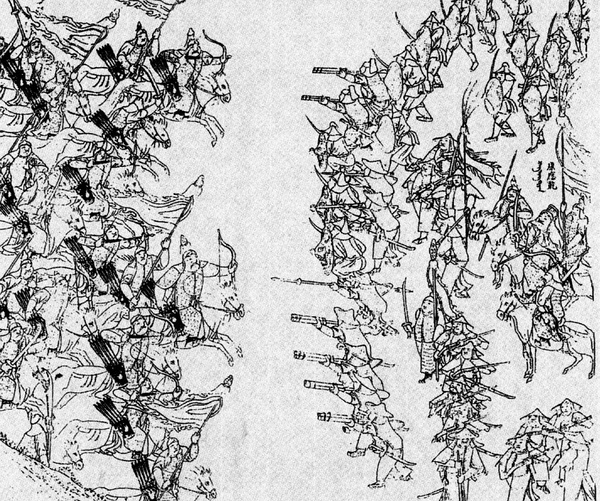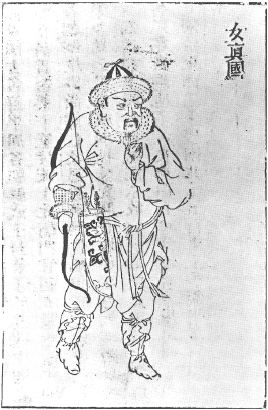|
Laimbu
Laimbu (; 26 January 1612 – 23 June 1646) was a Manchu noble of the early Qing Dynasty. Biography Laimbu was born of the Manchu Aisin Gioro clan as the 13th son of Nurhaci, founder of the Qing Dynasty. His mother was Lady Sirin Gioro (西林覺羅氏), a concubine of Nurhaci. He was a younger half-brother of Nurhaci's successor Hong Taiji. In 1634, during Hong Taiji's reign, Laimbu was appointed as Niuluzhangjing (牛錄章京) and in 1639 he was given a position in the Deliberative Council of Princes and Ministers. In 1642 he followed his older half-brother Ajige to attack the Ming Dynasty and defeated a Ming army at Ningyuan. Ajige returned to his residence without waiting for an announcement of the rewards granted to him by Hong Taiji in recognition of his contributions. This was seen as showing disrespect towards the emperor. Laimbu was also found guilty because he did not stop Ajige, and was stripped of his position in the council. In 1645 Laimbu was granted the ti ... [...More Info...] [...Related Items...] OR: [Wikipedia] [Google] [Baidu] |
Nurhaci
Nurhaci (14 May 1559 – 30 September 1626), also known by his temple name as the Emperor Taizu of Qing (), was a Jurchen chieftain who rose to prominence in the late 16th century in Manchuria. A member of the House of Aisin-Gioro, he reigned as the founding khan of the Later Jin dynasty of China from 1616 to 1626. Nurhaci reorganized and united various Jurchen tribes (the later "Manchu"), consolidated the Eight Banners military system, and eventually launched attacks on both the Ming and Joseon dynasties. His conquest of Ming dynasty's northeastern Liaodong region laid the groundwork for the Qing conquest of the Ming by his descendants, who founded the Qing dynasty in 1636. He is also generally credited with ordering the creation of a new written script for the Manchu language based on the Mongolian vertical script. Name and titles Nurhaci is written as in Manchu language. Some suggest that the meaning of the name in the Manchu language is "the skin of a wild boar", other ... [...More Info...] [...Related Items...] OR: [Wikipedia] [Google] [Baidu] |
Manchu Name
Manchu names are the names of the Manchu people in their own language. In addition to such names, most modern Manchus live in China and possess Chinese names. Traditionally, Manchus were called only by their given names in daily life although each belonged to a clan with its own clan name (Manchu: ''hala''). Each clan would be divided into several sub-clans (''mukūn''), but these did not have separate names. Given names Manchus given names are distinctive. Generally, there are several forms, such as bearing suffixes "-ngga", "-ngge" or "-nggo", meaning "having the quality of"; bearing the suffixes "-tai" or "-tu", meaning "having"; bearing the suffix, "-ju", "-boo"; numerals or animal names. Manchu given names were used solely or with titles but not with clan names. For example, Fiyanggū, who was from the Donggo clan, belonged to the Manchu Plain White Banner and distinguished himself in the campaigns against the Dzungars, was usually called "Fiyanggū be" (Lord Fiyanggū) s ... [...More Info...] [...Related Items...] OR: [Wikipedia] [Google] [Baidu] |
Fuca Clan
Fuca may refer to: *Juan de Fuca Juan de Fuca (10 June 1536, Cefalonia 23 July 1602, Cefalonia)Greek Consulate of Vancouver,Greek Pioneers: Juan de Fuca. was a Greeks, Greek maritime pilot, pilot who served Philip II of Spain, PhilipII of Spanish Empire, Spain. He is best know ... (1536 - 1602), a Greek maritime pilot in the service of the Spanish king Philip II * Fuca (clan), a Manchu clan See also * {{Disambig ... [...More Info...] [...Related Items...] OR: [Wikipedia] [Google] [Baidu] |
1646 Deaths
It is one of eight years (CE) to contain each Roman numeral once (1000(M)+500(D)+100(C)+(-10(X)+50(L))+5(V)+1(I) = 1646). Events January–March * January 5 – The English House of Commons approves a bill to provide for Ireland to be governed by a single Englishman. * January 9 – The Battle of Bovey Heath takes place in Devonshire, as Oliver Cromwell's New Model Army surprises and routs the Royalist camp of Lord Wentworth. * January 19 – Sir Richard Grenville, 1st Baronet, a Royalist fighting for Prince Charles against Oliver Cromwell's Commonwealth, is imprisoned for insubordination after proposing to make Cornwall self-governing in order to win Cornish support for the Royalists. After being incarcerated at the tidal island of St Michael's Mount off of the coast of Cornwall, he is allowed to escape in March to avoid capture by Cromwell's troops. * January 20 – Francesco Molin is elected as the 99th Doge of Venice after 23 ballots, and govern ... [...More Info...] [...Related Items...] OR: [Wikipedia] [Google] [Baidu] |
1612 Births
Year 161 ( CLXI) was a common year starting on Wednesday (link will display the full calendar) of the Julian calendar. At the time, it was known as the Year of the Consulship of Caesar and Aurelius (or, less frequently, year 914 ''Ab urbe condita''). The denomination 161 for this year has been used since the early medieval period, when the Anno Domini calendar era became the prevalent method in Europe for naming years. Events By place Roman Empire * March 7 – Emperor Antoninus Pius dies, and is succeeded by Marcus Aurelius, who shares imperial power with Lucius Verus, although Marcus retains the title Pontifex Maximus. * Marcus Aurelius, a Spaniard like Trajan and Hadrian, is a stoical disciple of Epictetus, and an energetic man of action. He pursues the policy of his predecessor and maintains good relations with the Senate. As a legislator, he endeavors to create new principles of morality and humanity, particularly favoring women and slaves. * Aurelius reduces ... [...More Info...] [...Related Items...] OR: [Wikipedia] [Google] [Baidu] |
Ranks Of Imperial Consorts In China
The ranks of imperial consorts have varied over the course of Chinese history but remained important throughout owing to its importance in management of the inner court and in imperial succession, which ranked heirs according to the prominence of their mothers in addition to their strict birth order. Regardless of the age, however, it is common in English translation to simplify these hierarchy into the three ranks of Empress, consorts, and concubines. It is also common to use the term "harem", an Arabic loan word used in recent times to refer to imperial women's forbidden quarters in many countries. In later Chinese dynasties, these quarters were known as the back palace (後宮; ''hòugōng''). In Chinese, the system is called the Rear Palace System (後宮制度; ''hòugōng zhìdù''). Early history There exists a class of consorts called Ying (媵; ''yìng'') during early historical times in China. These were people who came along with brides as a form of dowry. It could be t ... [...More Info...] [...Related Items...] OR: [Wikipedia] [Google] [Baidu] |
Fuman
Fuman (; ; died 1542) was Chieftain of the Jianzhou Jurchens and an ancestor of the future Qing dynasty emperors. His father was Sibeoci Fiyanggū. His family name was Aisin Gioro (愛新覺羅). History Fuman was the great-grandfather of Nurhaci, who would reorganise and unite various Jurchen tribes. He lived in Hetuela or Hetu Ala (赫圖阿拉). From 1522 to 1542, he was governor, known as Dudu Fuman, of the Dudu Jianzhou Left Guard (建州左衛), a post also held and established by his paternal grandfather and father Sibeoci Fiyanggū. After Fuman died in 1542, he was buried in Hetuela's old city, also known as Xingjing (興京). In 1636, Huang Taiji established the Qing dynasty and posthumously honored Fuman as King of Qing (慶王); in 1648, he was given the posthumous name Emperor Zhi (直皇帝) and temple name Xingzu (興祖). The three ancestors, Qing Zhaozu, Jingzu and Xianzu, were buried in Xingjing. In 1659, Fuman was buried and paid respect at the Yong Ma ... [...More Info...] [...Related Items...] OR: [Wikipedia] [Google] [Baidu] |
Giocangga
Giocangga (Manchu: ; ; 1526–1583) was the son of Fuman and the paternal grandfather of Nurhaci, the man who unified the Jurchen peoples and founded the Later Jin dynasty of China. Both he and his son Taksi attacked Atai's fort, which was being besieged by a rival Jurchen chieftain Nikan Wailan (; 尼堪外蘭 ''Níkān Wàilán''), who promised the governance of the city to whoever would kill Atai. One of Atai's underlings rebelled and murdered him. Both Giocangga and Taksi were killed by Nikan Wailan under unclear circumstances. Giocangga, Taksi and Nikan were all under command of Li Chengliang. Giocangga was accorded the temple name Jǐngzǔ (景祖) and the posthumous name Emperor Yi (翼皇帝) by the Qing dynasty. In 2005, a study led by a researcher at the British Wellcome Trust Sanger Institute suggested that Giocangga might be a direct male-line ancestor of over 1.5 million men, mostly in northeastern China. [...More Info...] [...Related Items...] OR: [Wikipedia] [Google] [Baidu] |
Taksi
Taksi (Manchu: ; ; 1543–1583) or posthumously titled as Emperor Xuan was a Jurchen chieftain and father of Nurhaci, founder of the Later Jin dynasty, and the fourth son of Giocangga. A member of the House of Aisin-Gioro, he was killed in an attack on Gure (古哷 ''Gǔlè'') by a rival Jurchen chieftain Nikan Wailan in 1583. Taksi had nine recorded children. Nurhaci was the first born son and also the most highly achieved. It seems like several of Nurhaci's brothers had names that closely resembled his phonetically. The Seven Grievances issued by Nurhaci claimed that the Ming dynasty killed Taksi for no reason. This caused Nurhaci to declare war on the Ming, which eventually led to the destruction of the Ming and rise of the Qing dynasty. During the reign of the Shunzhi Emperor, the court of the Qing dynasty retroactively gave Taksi the temple name Xianzu (顯祖) and the posthumous name Emperor Xuan (宣皇帝). Family Wife * Empress Xuan, of the Hitara clan (宣皇 ... [...More Info...] [...Related Items...] OR: [Wikipedia] [Google] [Baidu] |
Borjigin
A Borjigin, ; ; russian: Борджигин, Bordžigin; English plural: Borjigins or Borjigid (from Middle Mongolian);''Histoire des campagnes de Gengis Khan'', p. 119. Manchu plural: is a member of the Mongol sub-clan, which started with Bodonchar Munkhag of the Kiyat clan. Yesugei's descendants were thus said to be Kiyat-Borjigin. The senior Borjigids provided ruling princes for Mongolia and Inner Mongolia until the 20th century.Humphrey & Sneath, p. 27. The clan formed the ruling class among the Mongols and some other peoples of Central Asia and Eastern Europe. Today, the Borjigid are found in most of Mongolia, Inner Mongolia and Xinjiang, and additionally genetic research has shown that descent from Genghis Khan and Amir Timur Barlas is common throughout Central Asia and other regions. Origin and name The patrilineage began with Blue-grey Wolf (Börte Chino) and Fallow Doe (Gua Maral). According to ''The Secret History of the Mongols'', their 11th generation descend ... [...More Info...] [...Related Items...] OR: [Wikipedia] [Google] [Baidu] |
Shunzhi Emperor
The Shunzhi Emperor (15 March 1638 – 5 February 1661) was the second Emperor of China, emperor of the Qing dynasty of China, and the first Qing emperor to rule over China proper, reigning from 1644 to 1661. A Deliberative Council of Princes and Ministers, committee of Manchu princes chose him to succeed his father, Hong Taiji (1592–1643), in September 1643, when he was five years old. The princes also appointed two co-regents: Dorgon (1612–1650), the 14th son of the Qing dynasty's founder Nurhaci (1559–1626), and Jirgalang (1599–1655), one of Nurhaci's nephews, both of whom were members of the Aisin Gioro, Qing imperial clan. From 1643 to 1650, political power lay mostly in the hands of Dorgon. Under his leadership, the Qing Empire conquered most of the territory of the fallen Ming dynasty (1368–1644), chased Southern Ming, Ming loyalist regimes deep into the southwestern provinces, and established the basis of Qing rule over China proper despite highly unpopular ... [...More Info...] [...Related Items...] OR: [Wikipedia] [Google] [Baidu] |





